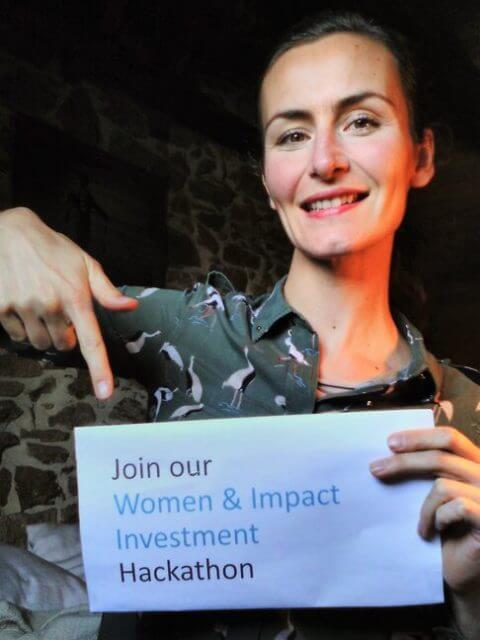Marie Geneste is founder and CEO of The C Collective, a marketing and ‘user experience’ consultancy for impact technology – and organiser of the Women and Impact Hackathon starting on March 22nd.
To mark International Women’s Day, she tells Good With Money why more women don’t invest, why a ‘hackathon’ is needed, and how the industry can help to educate, inspire and empower women to unlock their financial potential.
Why are the topics of women and impact investment so important to you?
Back in 2019, at the time when we still picked up free newspapers at the tube station, I came across an article from Stylist titled Why aren’t more women investing? I had a real epiphany. It made me reflect on my own attitudes to money and investment as a working mum and entrepreneur. It also resonated with a lot of stories of women I knew. They all revolved around opportunities, freedom, independence, and justice.
Then I did further research and realised how big the gender gap was and how much it was holding back women and affecting our capacity to tackle huge social and environmental problems. The gender investment gap is huge and the COVID crisis is only making it worse.
In the UK, most women have never made any investment – 52 per cent of women have never help an investment product, vs 37% of men (Yougov 2018). This investment shortage adds to the gender pay gap, leading to women retiring with savings which are three times lower than that of men.
At the C Collective we advise many impact entrepreneurs and investors. This has made us aware of the funding gap to finance the United Nations Sustainable Development Goals – a mere $2.5 trillion (£1.8 trillion) a year.
Why launch a hackathon?
We know women are totally capable of investing – they’re actually better than men at it according to research – and also more likely to invest their money ethically. So that’s why we are launching an innovation challenge aimed at better understanding the attitudes of women towards money and creating solutions to empower them financially.
Our hackathon is really about challenging the status quo of a finance world that is designed by men for men, consciously keeping women away from the power and freedom it grants. We want to get lots of people with diverse backgrounds together, and take them through a design thinking innovation process to empathise with women and co-create concrete solutions to unlock their financial power for good.
What have you learnt from your initial research?
Besides analysing a lot of existing research, we recently ran a series of qualitative interviews with UK-based women of varied backgrounds and income levels. We explored their relationship with money, motivations and barriers to saving and investing and the impact of the COVID crisis.
The first insight is that finance is framed in a way that just doesn’t click with many women. At best they are bored, at worse they are scared.
Many women talk about the complex jargon, the white males in grey suits that makes the whole thing uninteresting. For some women, personal finance is associated with numbers and maths, which makes the whole topic overwhelming or even scary.
Our research has also confirmed that women’s relationship to money is deeply rooted in their place in society in general and in their family history in particular. The cultural heritage of women being the care provider and men being the bread winner is still affecting women’s overall confidence with money management and their ability to sell their worth in their professional life.
Similarly, there is a common theme of women undervaluing their financial literacy, even for those who are already investing. Typically, some interviewees holding a savings account, an individual savings account (ISA), property and work pension funds would say “I don’t really invest, it’s not my thing”.
On the other end, one of the women we interviewed was telling us that while browsing a crowdfunding platform and reviewing start-ups to invest in, she was amazed by the fact only men asked questions on the website, and their questions were not really questions but more affirmations to show off their own knowledge.
But the good news is some women from all backgrounds and income level are doing a great job at managing their money and investing. Their experience can be extremely inspiring for their friends and family.
What is the opportunity for women investing?
The opportunity we see for those who were lucky enough to keep a steady income during the COVID crisis, is a cut in non-essential purchases which increased disposable income. This has led to some saving pots being effortlessly created but also an active focus on more essential spending which may last beyond the lockdown episodes.
The other positive aspect we saw is women’s growing interest in social and environmental causes.
Few women are actually aware of the potential social or environmental impact of their investment choices but when presented with the opportunity of positive outcomes and returns, they see this as a key driver for starting to invest or investing more.
Basically, our research confirms there’s a huge opportunity to educate, inspire and empower women to build a stronger financial independence while getting their savings to help fix the world’s biggest environmental and social issues.
This hackathon is our humble contribution to this cause and we sincerely hope it will help plant seeds of action and solutions.
“Cumulatively small decisions, choices, actions, make a very big difference.”
Renowned ethologist, Dr Jane Goodall




